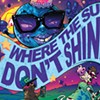Wednesday, October 22, 2008
Fear & Loathing In Milton: Full Transcript
Posted
By Dan Bolles
on Wed, Oct 22, 2008 at 10:00 AM
Canadian-born songwriter Bruce Innes has had quite a career. He performed hit singles such as "Mr. Monday" and the famed Vietnam war protest song "One Tin Soldier" with his band The Original Caste in the late 1960s. He wrote and recorded with artists such as Ian Tyson, John Denver and Joni Mitchell. And those illustrious associations are but the tip of the iceberg. Innes' credits also include work with iconic oddball Ray Stevens ("You could never write a song too silly for Ray" he says); outlaw-country badass Waylon Jennings ("a quiet guy"); and legendary comedic actor Leslie Neilsen ("Kind of a hound. All he did was chase women"). And believe me, the list goes on.
Seven Days recently caught up with Innes by phone from Milton in advance of his upcoming Vermont performances, which feature a blend of music and stories from his remarkable career. We chatted about music, protest songs and, of course, his good friend Hunter S. Thompson, who wrote about Innes in his landmark novel Fear and Loathing in Las Vegas.
SEVEN DAYS: Did you ever imagine that the lyrics to "One Tin Soldier would be as relevant today as they were in the Vietnam era?
BRUCE INNES: Actually, Dan, what happened was, one of the guys, Brian Potter, who was from London England, a songwriter over there, had just got through reading Lord of the Rings. So he started out with those sort of storytelling lyrics. Really, we had no idea to start with that it was sort of an anti-war song. But when we released it, it was right in the middle of the war and it became sort of an anthem.
It was a mixed blessing in lots of ways, because the country was really divided. It's hard to imagine now, but t here was a huge contingent of people who thought it was anti-patriotic. It was not like it is today. I mean, it really caused a lot of trouble. Lots of radio stations banned it. You'd think you'd get lots of letters saying "Oh gee, what a nice song," or whatever. But we had lots of letters saying things like, "Why don't you go back to Canada, you son of a bitch?" That sort of thing. So it's sort of a mixed blessing in that respect.
SD: It's like a precursor to Fox News.
BI: Yeah. Exactly! And you know, we were just trying to sing and play. So it was interesting.
SD: Given that many of the people in charge of our current military conflicts are products of that generation, do you feel the lessons of the Vietnam era have been forgotten?
BI: I do, in lots of ways. Every time we read about another one of our young people being killed . . . we seem to be fighting in a place where we're not wanted. It kind of reminds me of the Vietnam war in lots of ways. You wonder if maybe we're doing the same thing all over again. It's hard to know.
SD: It almost seems as though antiwar songs have become a sort of campy, nostalgic cliche. Do you still believe in the power of protest songs to affect change?
BI: I don't know if I have, actually. One thing I think it does do is to get people talking and thinking. I was thinking the other night about Crosby, Stills & Nash's song "Ohio," about Kent State . . . That got a lot of people thinking. And of course, at that time I was close friends with Hunter Thompson and he was very anti-war and very anti-establishment. I think those kinds of things got a lot of people talking.
I think protest songs get people talking. I don't know that they change a lot of people's minds. I don't know that I've ever changed anybody's mind, quite frankly. But I think they do get people talking and thinking. And that's a good thing.
SD: How did you come to know Hunter S. Thompson?
BI: Well, when I was in college, the only way I could pay for my education, was I played and sang in bars. I went to the University of Montana and I was playing in the Gun Room at the Finlen Hotel in Butte, Montana, one summer and Hunter came up to do a story on the mines for the Wall Street Journal. He was a stringer for the Journal, and he had just gotten out of the service. And so he was there fr a month and we quickly figured out that we were the only two sane people in the town of Butte . . . although it may have been the other way around.
We really had a wonderful time, a great lifelong friendship. And I ended up going to California with him. And that's how I met John Denver. He was the house singer at Snowmass while I was the house singer at Aspen. And Hunter really talked me into coming to Aspen. We were friends for a long, long time. All the stuff he wrote about me in Fear and Loathing was only 50 perc . . . 40, er, 30 percent true.
SD: I should hope so! Tell me something about Hunter that most people wouldn't know.
BI: He loved volleyball. He was a really good athlete. he always had a volleyball net up in the yard at Woody Creek, on Owl Farm. We played a lot of volleyball. He was a good athlete and I think as his health deteriorated in later years that really contributed to him being depressed and maybe ending up the way it did.
But he had a great sense of humor. Absolutely great. One time I was at home in Canada and he called at 4 a.m. and woke my mother and father up. He asked to speak to me and I went to the telephone and heard this huge explosion on the other end of the line. It was a gunshot. And Hunter yells, "I got the bastard!" And I said, "What do you mean? An intruder?" And he he said, "No, my typewriter. Nobody could write anything with a piece of shit like that."
I don't think my parents ever recovered from that.
SD: You've worked with an incredible number and maybe more interestingly and incredible variety of artists. Who were some of your unexpected favorites?
BI: Well I've been doing it a long time, so that kind of counts for something. But unexpected . . . maybe one was Ray Stevens. You could never write a song too silly for Ray. I just loved the guy. When he first recorded a bunch of my stuff, it really helped me. That was sort of an unusual thing, because I"m not much of a country guy.
With "One Tin Soldier" we had a little record label called TA Records. And the other artists on the record label were Jim Seals and Dash Crofts, so I worked wit Seals & Crofts quite a bit. And they were really unusual. Very talented. But quite a bit older than I was at the time and really, quite unusual. They wrote songs that, until they moved to Warner Brothers, that no one would really pay much attention to. It was a unique experience. Great musicians.
SD: You sang on "Rocky Mountain High"?
BI: Yeah. I sang backup on that album. John [Denver] took me to New York when he was recording it and, I don't know. He was really a fun guy. A guy that if you'd known him, you'd really miss him. Just one of those really, nice, really talented people.
SD: I bet. You mentioned that you could never write a song too sill for Ray Stevens. What about Leslie Neilsen?
BI: Ah yes. I had a variety show in Canada for a while and Leslie came up a and was a guest a couple of times because he was a Canadian guy and was a bigger star up there than he was here at the time. This was before he'd done all of those ridiculous movies. He was really truly a funny guy too. But he was a hound, you know? All he did was chase women. It was amazing, because he was kind of an older guy and I kept thinking "Holy mackerel! It's a wonder nobody's shot this guy." You know? But he really turned out to be a big star.
SD: I'm a big baseball fan. So I thought it was interesting that you were involved with L.A. Dodgers great, Maury Wills.
BI: I was. I was working at a little bar in Spokane Washington and he lived there when he was a shortstop with the Dodgers. And he came in and heard me and said, "Gee whiz. I love to play and and sing. And I just broke Ty Cobb's base stealing record and people are asking me to come and make appearances and I don't know what to do." So I wrote him nine little baseball songs and gosh, we traveled all around the world. Mostly it consisted of him playing the banjo and both of us singing. And then he signed baseballs (laughs). He was a great guy. But don't ever get in a snowball fight with him. He'll take the top of your head off. Unbelievable arm.
SD: How did he take the Dodgers' loss in the playoffs this year?
BI: You know I haven't talked to him since. But I think he's probably not happy about it.
SD: I bet. It seems like you've hung out with two-thirds of my personal heroes. So I have to ask you about Waylon Jennings.
BI: I first met him in Lake Tahoe years ago. He had a folk group called Waylon Jennings and The Kimberleys. And he was actually a folk singer. And he was good, I'm not kidding you. The Kimberleys were like, three girls and they were good. Then he sort of got country after that. I really thought he wrote good songs. A really good singer. But his health was crappy for a long time. You know, he was a diabetic. And that's, you know . . .
I admired him a lot. He was a quiet guy. You'd think, you know when you read about he and Willie and Kris Kristofferson, you'd think he was this really crazy outgoing guy like Hunter. But he wasn't like that. He was more of an introspective type. A great talent.
Comments
Comments are closed.
Since 2014, Seven Days has allowed readers to comment on all stories posted on our website. While we’ve appreciated the suggestions and insights, the time has come to shut them down — at least temporarily.
While we champion free speech, facts are a matter of life and death during the coronavirus pandemic, and right now Seven Days is prioritizing the production of responsible journalism over moderating online debates between readers.
To criticize, correct or praise our reporting, please send us a letter to the editor. Or send us a tip. We’ll check it out and report the results.
Online comments may return when we have better tech tools for managing them. Thanks for reading.











































